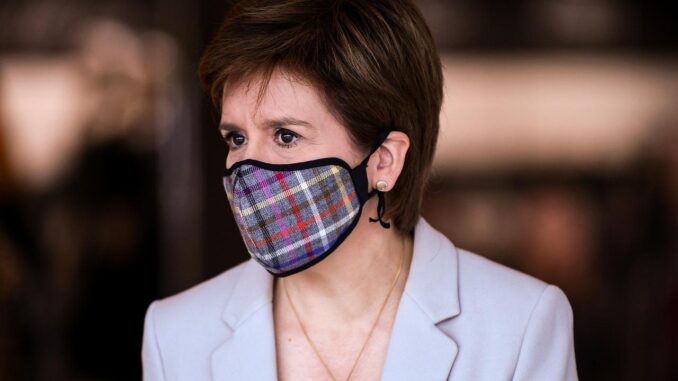
Britain’s government failed to determine whether Russia meddled in the 2016 referendum on membership in the EU, a parliamentary report released on Tuesday said, demanding the intelligence community investigate the issue and make its findings public.FILE PHOTO: First Minister of Scotland Nicola Sturgeon wears a Tartan mask as she visits New Look at Fort Kinnaird Retail Park, in Edinburgh, Scotland June 26, 2020. Sturgeon viewed some of the changes in shops ahead of the gradual re-opening of retailers on Monday. Jeff J Mitchell/Pool via REUTERS
The long-anticipated report by parliament’s intelligence and security committee found that Russia had tried to influence a separate referendum in 2014 when voters in Scotland rejected independence.
But it said the committee was unable to determine whether Russia attempted to influence the European Union referendum. When asked for evidence, Britain’s main domestic intelligence agency MI5 had produced just six lines of text, it said.
“It is nonetheless the Committee’s view that the UK Intelligence Community should produce an analogous assessment of potential Russian interference in the EU referendum and that an unclassified summary of it be published,” it said in the report, which was produced more than a year ago and shelved until now.
The government of Prime Minister Boris Johnson, who came to power as one of the leading figures in the victorious campaign to leave the EU, responded saying it had seen no evidence of “successful” Russian intervention in the referendum.
It rejected the call for a review.
RELATED COVERAGE
- Factbox: UK intelligence committee publishes report on Russian influence
- UK government says no evidence of successful Russian meddling in Brexit vote
See more stories
The report cast Russia as a hostile power which posed a significant threat to Britain and the West across a range of fronts, from espionage and cyber to election meddling and laundering dirty money.
“It appears that Russia considers the UK one of its top Western intelligence targets,” the report said.
It said there were open source indications that Russia had sought to influence the Brexit campaign but that hard evidence had not been produced.
“The key point is … they had not sought even to ask that question and that is at the heart of this report,” Stewart Hosie, a Scottish National Party member of committee, told reporters.
“We saw no evidence because there was no evidence and no one in government sought to look or ask the questions that needed to be asked,” said Labour lawmaker Kevan Jones.
The Kremlin said Russia has never interfered in another country’s electoral processes. Russia has repeatedly denied meddling in the West, casting the United States and Britain as gripped by anti-Russian hysteria.
“Russia has never interfered in the electoral processes of any country in the world – not the United States, not Britain, nor any other countries,” Kremlin spokesman Dmitry Peskov said.
Foreign Ministry spokeswoman Maria Zakharova cast the report as “Russophobia in a fake frame”.
RUSSIAN MEDDLING AND MONEY
Relations between London and Moscow plunged to post-Cold War lows after Britain blamed Russia for poisoning former Russian spy Sergei Skripal and his daughter Yulia with a nerve agent in the English city of Salisbury.
Last week, the British government said it believed Russian actors had tried to meddle in last year’s election, after the report was finished.
When discussing the EU referendum, the report is heavily redacted and there was a classified annex that was not published.
The committee also cast Russia as a source of corrupt money that had been welcomed in London, the world’s premier international financial capital.
“The UK welcomed Russian money, and few questions – if any – were asked about the provenance of this considerable wealth,” the report said. “The UK has been viewed as a particularly favourable destination for Russian oligarchs and their money.”
“It offered ideal mechanisms by which illicit finance could be recycled through what has been referred to as the London ‘laundromat’,” the report said.
Additional reporting by Alexander Marrow in Moscow; Writing by Guy Faulconbridge; Editing by Sarah Young, Paul Sandle and Peter Graff
BY REUTERS
